Séance plénière 3 – Vers une transition verte de la région euro-méditerranéenne : défis et opportunités sur la voie d’économies résilientes à zéro émission nette
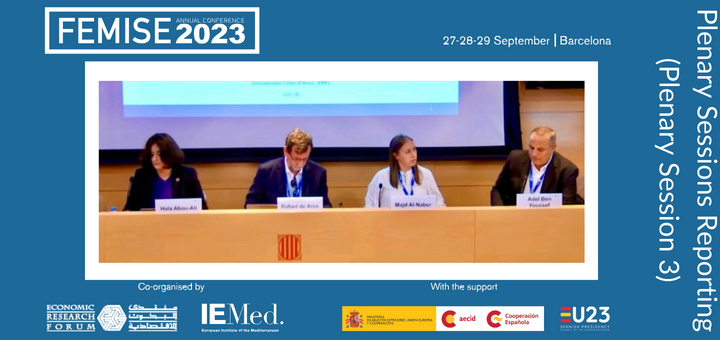
Putting the green transition at the heart of the Euromed partnership, while finding solutions to sustainability challenges will help the region progress in achieving its goals in terms of resilience, prosperity, and development. While a number of opportunities arise in the region, especially with regard to clean energy production, challenges call for greater cooperation and integration to mobilise investments, built sustainable infrastructure, transfer knowledge and technology, create decent jobs, and green the productive tissue.
Chair
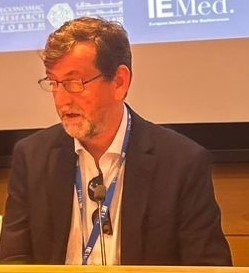 Rafael de Arce, Professor of Econometrics at the Universidad Autónoma de Madrid, states that the Mediterranean region is experiencing a decline in atmospheric conditions 20 percent faster than the rest of the world. He presents the two questions that will be examined during the plenary session: the challenges to achieving the green transition in the southern Mediterranean region and how to stimulate this transition through different policies.
Rafael de Arce, Professor of Econometrics at the Universidad Autónoma de Madrid, states that the Mediterranean region is experiencing a decline in atmospheric conditions 20 percent faster than the rest of the world. He presents the two questions that will be examined during the plenary session: the challenges to achieving the green transition in the southern Mediterranean region and how to stimulate this transition through different policies.
Speakers
- Adel Ben Youssef, Professor of Economics at the University of Nice Sophia-Antipolis, states that the Mena region is currently experiencing a double transition: an ecological and digital transition.
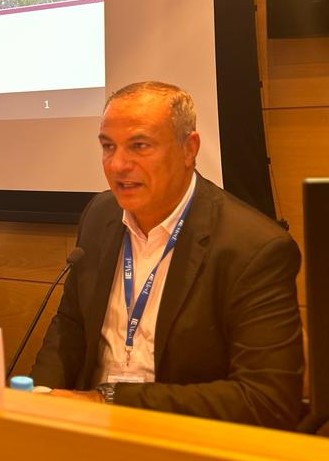 Technologies are skills-based and benefit the most skilled and talented people. When it comes to technological change, we need to differentiate between the speed and direction of technology while mastering both. As Dr. Adel points out, climate change is real, happening now and hitting our economies in several ways. Sustainable pathways for using the resources and moderate footprint are needed. We need a “big shift”, which requires the implementation of mitigation policies. This new paradigm is to achieve this costly change in a limited time. By 2030, an estimated 700 million people will be at risk of being displaced by drought. 1 billion children are at extremely high risk due to climate change. Digital transition can foster the ecological transition. Technology offers industries the opportunity to adapt and become more efficient by reducing resource usage and is a powerful awareness tool to encourage people to change their habits. As Dr Adel says, it is important to deepen EU Mediterranean integration through complementary regulation on digitalization and values.
Technologies are skills-based and benefit the most skilled and talented people. When it comes to technological change, we need to differentiate between the speed and direction of technology while mastering both. As Dr. Adel points out, climate change is real, happening now and hitting our economies in several ways. Sustainable pathways for using the resources and moderate footprint are needed. We need a “big shift”, which requires the implementation of mitigation policies. This new paradigm is to achieve this costly change in a limited time. By 2030, an estimated 700 million people will be at risk of being displaced by drought. 1 billion children are at extremely high risk due to climate change. Digital transition can foster the ecological transition. Technology offers industries the opportunity to adapt and become more efficient by reducing resource usage and is a powerful awareness tool to encourage people to change their habits. As Dr Adel says, it is important to deepen EU Mediterranean integration through complementary regulation on digitalization and values.
- Majd Al Naber, Director of Science for Society Centre at the Royal Scientific Society, states that food security has a concrete role in shaping the region’s economy, stability and sustainability of its livelihoods. It is estimated that 10 percent of the world’s population suffers from hunger. In the Middle East, around 100 million people face food insecurity due to external and internal shocks intensified by climate change.
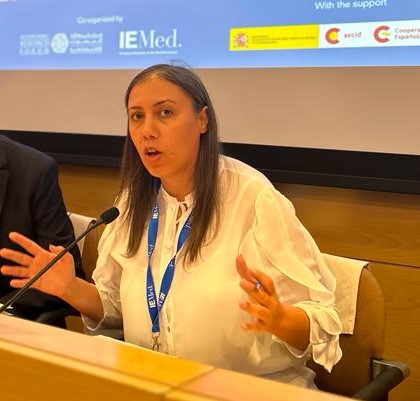 Globally, the agri-food system accounts for 70 percent of freshwater use, 30 percent of energy consumption and generates 90 percent of biodiversity, clearly demonstrating the close interlinkage between water, energy, food and the ecosystem (WEFEN). Despite advocacy efforts in favor of WEFE Nexus which, as Dr Magd states, is a healing tool that allows and promotes efficient use of resources, this approach is still not concretely implemented in the region. When we look at the policies that govern the water, energy and food sectors, we observe gaps that need to be defined and potentially reduced. This requires the introduction of new policy recommendations that examine the system as a whole in order to achieve sustainability. We must find alternative water sources to groundwater in order to maintain water use efficiency in our region’s agricultural food system. Ms. Majd recommends increasing the share of treated wastewater in order to reduce dependence on fresh water, which however requires social acceptance and concrete, affordable and accessible technology to the end user. Also, as she states: “in our region, we produce much more than we consume and we do not recycle, reuse, reproduce these foods efficiently”. It is necessary to use food waste in a way that composts it, introducing a new way of using fertilizers. The availability and sharing of data between different countries in the region is also vital as is how to use this data converted into knowledge for policy development.
Globally, the agri-food system accounts for 70 percent of freshwater use, 30 percent of energy consumption and generates 90 percent of biodiversity, clearly demonstrating the close interlinkage between water, energy, food and the ecosystem (WEFEN). Despite advocacy efforts in favor of WEFE Nexus which, as Dr Magd states, is a healing tool that allows and promotes efficient use of resources, this approach is still not concretely implemented in the region. When we look at the policies that govern the water, energy and food sectors, we observe gaps that need to be defined and potentially reduced. This requires the introduction of new policy recommendations that examine the system as a whole in order to achieve sustainability. We must find alternative water sources to groundwater in order to maintain water use efficiency in our region’s agricultural food system. Ms. Majd recommends increasing the share of treated wastewater in order to reduce dependence on fresh water, which however requires social acceptance and concrete, affordable and accessible technology to the end user. Also, as she states: “in our region, we produce much more than we consume and we do not recycle, reuse, reproduce these foods efficiently”. It is necessary to use food waste in a way that composts it, introducing a new way of using fertilizers. The availability and sharing of data between different countries in the region is also vital as is how to use this data converted into knowledge for policy development.
- Hala Abou-Ali, Vice President of the Institute of National Planning and Professor of Economics at the Faculty of Economics and Political Science (FEPS) at Cairo University, states that Southern Mediterranean countries are richly endowed with solar and wind energy resources that are considered the highest in the world, giving them the potential to emerge as significant producers of green energy. However, the energy mix remains below five percent in almost all countries of the Southern Mediterranean Countries. How can we harness this potential to meet all national energy demands while seizing the opportunity to build partnerships with the northern Mediterranean countries and the European Union?
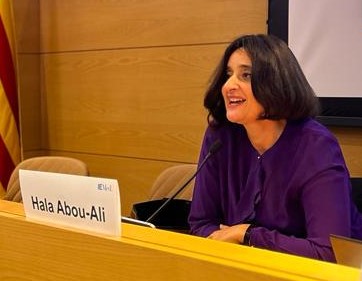 According to Dr. Hala, realizing this potential necessitates investments in infrastructure and technologies and policy frameworks that support the renewable energy development and cross-border cooperation on the water, food and energy Nexus. However, legal and regulatory barriers hinder investments in different southern Mediterranean countries in addition to disruptive factors such as the convertibility of the currencies, inflation and the lack of foreign reserves. The transition to low-carbon and climate-resilient economies and societies has far-reaching implications for labor markets and can really generate employment opportunities for young people, including women. As Dr. Hala states, green investments oriented towards sustainable and environmentally responsible projects have actually the power to reshape the South Mediterranean countries economies and drive innovation and create decent jobs. Civil society participation can also play a central role in promoting green policies that hold governments and corporations accountable while stimulating sustainable initiatives. As Dr. Hala states, “by working together north and south and all the players, we can unlock the immense potential of green energy and green jobs, paving the way for a brighter more sustainable future for the southern Mediterranean region and beyond”.
According to Dr. Hala, realizing this potential necessitates investments in infrastructure and technologies and policy frameworks that support the renewable energy development and cross-border cooperation on the water, food and energy Nexus. However, legal and regulatory barriers hinder investments in different southern Mediterranean countries in addition to disruptive factors such as the convertibility of the currencies, inflation and the lack of foreign reserves. The transition to low-carbon and climate-resilient economies and societies has far-reaching implications for labor markets and can really generate employment opportunities for young people, including women. As Dr. Hala states, green investments oriented towards sustainable and environmentally responsible projects have actually the power to reshape the South Mediterranean countries economies and drive innovation and create decent jobs. Civil society participation can also play a central role in promoting green policies that hold governments and corporations accountable while stimulating sustainable initiatives. As Dr. Hala states, “by working together north and south and all the players, we can unlock the immense potential of green energy and green jobs, paving the way for a brighter more sustainable future for the southern Mediterranean region and beyond”.
Watch The Full The Session :



